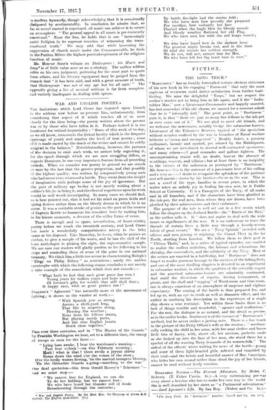FICTION.
THE LONG TRICK.•
" BARTIMELIS " has so frankly forestalled certain obvious criticism. of his new book in Iris engaging " Foreword " that only the most captious of reviewers could derive satisfaction from further fault- finding. We miss the delightful " Toros," but wo respect the author.e resolve net to bring him to life again, and if the " India- rubber Rm.," now a Lieutemud-Commander and happily married, has lost somewhat of his old charm, we ea t for a moment admit that ho is " infernolly dull." Tho great point, as " Bartimeea " puts it, is that " there aro just as many fine fellows in the ink-pot as ever came out of it." We aro glad to meet old friends, and w e welcome the newcomers, notably fledge the submarine-hunter, Lieutenant of the Volunteer Reserve, typical of " the specialists without number evolved by the war in branches of Naval warfare hitherto tuetnowu and uneuspected " ; Mouldy Sakes, a gunnery enthusiast, laconic and cynical, yet adored by the Midshipmen, of whom we are introduced to several well•contrusted specimens; and ninny others—nil good comrades end gallant fighters. The uncompromising realist will, no doubt, lament the absence of weaklings, wasters, and villains ; but at least there is no insipidity in the virtues of the sailorman as portrayed by " Bartimeus.'' His hero-wr•:•.bir, is the outcome of a passionate love of his calling and a very ner :mil desire to recognize the splendour of the patience and self-eacrilire shown by his brother-offieens in the war. This in not a novel of the type, familiar in resent year., iu which the writer takes an unholy joy in fouling his own noel, be it Public School or University. It is a Panegyric of the Navy, of all ranks and in all branches, and if the characters have been glorified in the ink-pot, the real men, from whom they are drawn, have been glorified by their achievements and their endurance.
The purpose of the tale is well set out in a few words which follow the chapter on the Jutland Battle—the " Battle of the Mist," as tho author calls it. It " does not aspire to deal with the wide issues or significances of the war. It is an endeavour to trace the threads of certain liver a little way through a loosely-woven fabric of great events." We see a " Navy Special," crowded with officers and men joining or rejoining the Grand Fleet in the far North, starting from London. We follow them to their goal in " Ultima Thule," and, in a series of typical episodes, are enabled to realize the endless activities, the labour:5 and relaxations, the chivalry, the camaraderie, and the solidarity of the Nervy. Most of the scenes are enacted in a battleship, but " Bartimeus door not forgot to render generous homage to the services of the tishingfleet; and one of the most thrilling chapters ie devoted to an experiment in submarine warfare, in which the qualities of the scientific expert and the practical submarine-hunter• aro admirably contnurted. And amid the diversions of mottle, boxing tournament, or picnic, and the chuff and "ragging" of Ward-room and (lun-room, one is always conscious of an atmosphere of suspense and vigilant expectancy. The coming of the battle is thus prepared for, and led up to, with an eye to truth as well es dramatic effect, and the author in confining his description to the experience of a single ship shows a wise restraint. Yet within these limits there is no lack of things terrible and wonderful, " agonies and exaltations." For the rest, the dialogue is as natural, and the detail as precise, as in the earlier books. Sentiment in of the essence of " Bart imeus's " method, but ho never strikes a jarring note. There is in fine Merit in the picture of the Petty Officer's wife at the station ; " mechani- cally rocking the child in her rums, with her neat dollies end brave little bite of finery, with, above all, her easiest., pathetic emits as she looked up into the face of her man, eho stood there for a symbol of all the warring Navy demander of its women-folk." Tho ordeal of the officers' wives waiting for news of the bottle—young and some of them lighthearted girls, sobered and ennobled by their trial—and the heroic and beautiful answer of Bre. Oterceigno, who hides her own wound rather than cloud the joy of her friends, cannot be read without lively emotion.














































 Previous page
Previous page